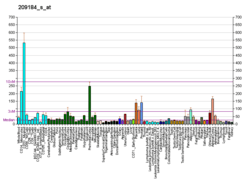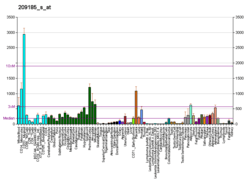IRS2
Insulin receptor substrate 2 is a protein that in humans is encoded by the IRS2 gene.[5]
Function
This gene encodes the insulin receptor substrate 2, a cytoplasmic signaling molecule that mediates effects of insulin, insulin-like growth factor 1, and other cytokines by acting as a molecular adaptor between diverse receptor tyrosine kinases and downstream effectors. The product of this gene is phosphorylated by the insulin receptor tyrosine kinase upon receptor stimulation, as well as by an interleukin 4 receptor-associated kinase in response to IL4 treatment.[6]
Mice lacking IRS2 have a diabetic phenotype[7] as well as a 40% reduction in brain mass.[8]
Interactions
IRS2 has been shown to interact with:
References
- 1 2 3 GRCh38: Ensembl release 89: ENSG00000185950 - Ensembl, May 2017
- 1 2 3 GRCm38: Ensembl release 89: ENSMUSG00000038894 - Ensembl, May 2017
- ↑ "Human PubMed Reference:".
- ↑ "Mouse PubMed Reference:".
- ↑ Ogihara T, Isobe T, Ichimura T, Taoka M, Funaki M, Sakoda H, Onishi Y, Inukai K, Anai M, Fukushima Y, Kikuchi M, Yazaki Y, Oka Y, Asano T (Oct 1997). "14-3-3 protein binds to insulin receptor substrate-1, one of the binding sites of which is in the phosphotyrosine binding domain". J Biol Chem. 272 (40): 25267–74. PMID 9312143. doi:10.1074/jbc.272.40.25267.
- ↑ "Entrez Gene: IRS2 insulin receptor substrate 2".
- ↑ Lin X, Taguchi A, Park S, Kushner JA, Li F, Li Y, White MF (October 2004). "Dysregulation of insulin receptor substrate 2 in beta cells and brain causes obesity and diabetes". J. Clin. Invest. 114 (7): 908–16. PMC 518668
 . PMID 15467829. doi:10.1172/JCI22217.
. PMID 15467829. doi:10.1172/JCI22217. - ↑ Schubert M, Brazil DP, Burks DJ, Kushner JA, Ye J, Flint CL, Farhang-Fallah J, Dikkes P, Warot XM, Rio C, Corfas G, White MF (August 2003). "Insulin receptor substrate-2 deficiency impairs brain growth and promotes tau phosphorylation". J. Neurosci. 23 (18): 7084–92. PMID 12904469.
- ↑ Sozzani P, Hasan L, Séguélas MH, Caput D, Ferrara P, Pipy B, Cambon C (March 1998). "IL-13 induces tyrosine phosphorylation of phospholipase C gamma-1 following IRS-2 association in human monocytes: relationship with the inhibitory effect of IL-13 on ROI production". Biochem. Biophys. Res. Commun. 244 (3): 665–70. PMID 9535722. doi:10.1006/bbrc.1998.8314.
- ↑ Rui L, Yuan M, Frantz D, Shoelson S, White MF (November 2002). "SOCS-1 and SOCS-3 block insulin signaling by ubiquitin-mediated degradation of IRS1 and IRS2". J. Biol. Chem. 277 (44): 42394–8. PMID 12228220. doi:10.1074/jbc.C200444200.
- ↑ Argetsinger LS, Norstedt G, Billestrup N, White MF, Carter-Su C (November 1996). "Growth hormone, interferon-gamma, and leukemia inhibitory factor utilize insulin receptor substrate-2 in intracellular signaling". J. Biol. Chem. 271 (46): 29415–21. PMID 8910607. doi:10.1074/jbc.271.46.29415.
- ↑ Verdier F, Chrétien S, Billat C, Gisselbrecht S, Lacombe C, Mayeux P (October 1997). "Erythropoietin induces the tyrosine phosphorylation of insulin receptor substrate-2. An alternate pathway for erythropoietin-induced phosphatidylinositol 3-kinase activation". J. Biol. Chem. 272 (42): 26173–8. PMID 9334184. doi:10.1074/jbc.272.42.26173.
- ↑ Kim B, Cheng HL, Margolis B, Feldman EL (December 1998). "Insulin receptor substrate 2 and Shc play different roles in insulin-like growth factor I signaling". J. Biol. Chem. 273 (51): 34543–50. PMID 9852124. doi:10.1074/jbc.273.51.34543.
- ↑ Hamer I, Foti M, Emkey R, Cordier-Bussat M, Philippe J, De Meyts P, Maeder C, Kahn CR, Carpentier JL (May 2002). "An arginine to cysteine(252) mutation in insulin receptors from a patient with severe insulin resistance inhibits receptor internalisation but preserves signalling events". Diabetologia. 45 (5): 657–67. PMID 12107746. doi:10.1007/s00125-002-0798-5.
Further reading
- White MF (1999). "The IRS-signalling system: a network of docking proteins that mediate insulin action.". Mol. Cell. Biochem. 182 (1-2): 3–11. PMID 9609109. doi:10.1023/A:1006806722619.
- Jiang H, Harris MB, Rothman P (2000). "IL-4/IL-13 signaling beyond JAK/STAT.". J. Allergy Clin. Immunol. 105 (6 Pt 1): 1063–70. PMID 10856136. doi:10.1067/mai.2000.107604.
- Sesti G, Federici M, Hribal ML, et al. (2001). "Defects of the insulin receptor substrate (IRS) system in human metabolic disorders.". FASEB J. 15 (12): 2099–111. PMID 11641236. doi:10.1096/fj.01-0009rev.
- Gibson SL, Ma Z, Shaw LM (2007). "Divergent roles for IRS-1 and IRS-2 in breast cancer metastasis.". Cell Cycle. 6 (6): 631–7. PMID 17361103. doi:10.4161/cc.6.6.3987.
- Dearth RK, Cui X, Kim HJ, et al. (2007). "Oncogenic transformation by the signaling adaptor proteins insulin receptor substrate (IRS)-1 and IRS-2.". Cell Cycle. 6 (6): 705–13. PMID 17374994. doi:10.4161/cc.6.6.4035.
- Johnston JA, Wang LM, Hanson EP, et al. (1996). "Interleukins 2, 4, 7, and 15 stimulate tyrosine phosphorylation of insulin receptor substrates 1 and 2 in T cells. Potential role of JAK kinases.". J. Biol. Chem. 270 (48): 28527–30. PMID 7499365. doi:10.1074/jbc.270.48.28527.
- Patti ME, Sun XJ, Bruening JC, et al. (1995). "4PS/insulin receptor substrate (IRS)-2 is the alternative substrate of the insulin receptor in IRS-1-deficient mice.". J. Biol. Chem. 270 (42): 24670–3. PMID 7559579. doi:10.1074/jbc.270.42.24670.
- Sun XJ, Wang LM, Zhang Y, et al. (1995). "Role of IRS-2 in insulin and cytokine signalling.". Nature. 377 (6545): 173–7. PMID 7675087. doi:10.1038/377173a0.
- Ridderstråle M, Degerman E, Tornqvist H (1995). "Growth hormone stimulates the tyrosine phosphorylation of the insulin receptor substrate-1 and its association with phosphatidylinositol 3-kinase in primary adipocytes.". J. Biol. Chem. 270 (8): 3471–4. PMID 7876077. doi:10.1074/jbc.270.8.3471.
- Platanias LC, Uddin S, Yetter A, et al. (1996). "The type I interferon receptor mediates tyrosine phosphorylation of insulin receptor substrate 2.". J. Biol. Chem. 271 (1): 278–82. PMID 8550573. doi:10.1074/jbc.271.1.278.
- Beitner-Johnson D, Blakesley VA, Shen-Orr Z, et al. (1996). "The proto-oncogene product c-Crk associates with insulin receptor substrate-1 and 4PS. Modulation by insulin growth factor-I (IGF) and enhanced IGF-I signaling.". J. Biol. Chem. 271 (16): 9287–90. PMID 8621590. doi:10.1074/jbc.271.16.9287.
- Sawka-Verhelle D, Tartare-Deckert S, White MF, Van Obberghen E (1996). "Insulin receptor substrate-2 binds to the insulin receptor through its phosphotyrosine-binding domain and through a newly identified domain comprising amino acids 591-786.". J. Biol. Chem. 271 (11): 5980–3. PMID 8626379. doi:10.1074/jbc.271.11.5980.
- He W, Craparo A, Zhu Y, et al. (1996). "Interaction of insulin receptor substrate-2 (IRS-2) with the insulin and insulin-like growth factor I receptors. Evidence for two distinct phosphotyrosine-dependent interaction domains within IRS-2.". J. Biol. Chem. 271 (20): 11641–5. PMID 8662806. doi:10.1074/jbc.271.20.11641.
- Zhang WR, Li PM, Oswald MA, Goldstein BJ (1996). "Modulation of insulin signal transduction by eutopic overexpression of the receptor-type protein-tyrosine phosphatase LAR.". Mol. Endocrinol. 10 (5): 575–84. PMID 8732688. doi:10.1210/me.10.5.575.
- Argetsinger LS, Norstedt G, Billestrup N, et al. (1997). "Growth hormone, interferon-gamma, and leukemia inhibitory factor utilize insulin receptor substrate-2 in intracellular signaling.". J. Biol. Chem. 271 (46): 29415–21. PMID 8910607. doi:10.1074/jbc.271.46.29415.
- Thiselton DL, Hampson RM, Nayudu M, et al. (1997). "Mapping the RP2 locus for X-linked retinitis pigmentosa on proximal Xp: a genetically defined 5-cM critical region and exclusion of candidate genes by physical mapping.". Genome Res. 6 (11): 1093–102. PMID 8938433. doi:10.1101/gr.6.11.1093.
- Izuhara K, Harada N (1997). "Interleukin-4 activates two distinct pathways of phosphatidylinositol-3 kinase in the same cells.". Biochem. Biophys. Res. Commun. 229 (2): 624–9. PMID 8954948. doi:10.1006/bbrc.1996.1854.
- Vanhaesebroeck B, Welham MJ, Kotani K, et al. (1997). "P110delta, a novel phosphoinositide 3-kinase in leukocytes.". Proc. Natl. Acad. Sci. U.S.A. 94 (9): 4330–5. PMC 20722
 . PMID 9113989. doi:10.1073/pnas.94.9.4330.
. PMID 9113989. doi:10.1073/pnas.94.9.4330. - Sawka-Verhelle D, Baron V, Mothe I, et al. (1997). "Tyr624 and Tyr628 in insulin receptor substrate-2 mediate its association with the insulin receptor.". J. Biol. Chem. 272 (26): 16414–20. PMID 9195949. doi:10.1074/jbc.272.26.16414.
- Algenstaedt P, Antonetti DA, Yaffe MB, Kahn CR (1997). "Insulin receptor substrate proteins create a link between the tyrosine phosphorylation cascade and the Ca2+-ATPases in muscle and heart.". J. Biol. Chem. 272 (38): 23696–702. PMID 9295312. doi:10.1074/jbc.272.38.23696.
This article is issued from
Wikipedia.
The text is licensed under Creative Commons - Attribution - Sharealike.
Additional terms may apply for the media files.






